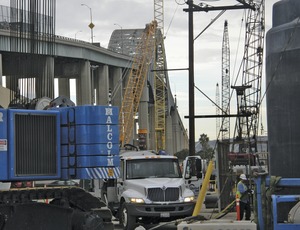
A major port improvement program in Long Beach, Calif., is struggling in stormy waters amid personnel upheavals and the recent repeal of a cargo fee meant to help fund more than $4 billion in road, rail, environmental and dredging construction projects.
Scores of contractors are in the midst of billions of dollars' worth of work, including the new Gerald Desmond Bridge on which site-prep complications added $136 million to its $1-billion price tag. Also, the $1.2-billion Middle Harbor project estimate recently climbed by another $85 million.
In November, Long Beach's board ousted President Thomas Fields while he was overseas on business. The City Council approved Field's termination and repeal of the $15-per-shipping-container fee. Commissioner Nick Sramek also resigned.
"The board of commissioners plays a critical role in construction projects at the port because it approves change orders over $100,000," says Patrick Harder, an attorney at Nossaman LLP, Los Angeles, representing the port.
Long Beach Harbor commissioners had approved the infrastructure cargo fee in 2007, to be implemented on Jan. 1, 2009. The fee was later reduced to $6 per container but was postponed.
"Projects [such as] the Gerald Desmond are built with a mix of funding from the port [and] federal, state and local authorities," says John Pope, a spokesman. "The cargo fee was not going to be directly tied to any construction contract. This fee was a framework for capital improvement projects, but the recession hit, and it never got implemented."
Fee or no fee, the Port of Long Beach will push forward in anticipation of funding support from other state agencies and hopes that new political appointees will work in harmony. "Contractors want to come in after the dust has settled and don't want to be involved in tussles about funding sources," Harder says.


Post a comment to this article
Report Abusive Comment